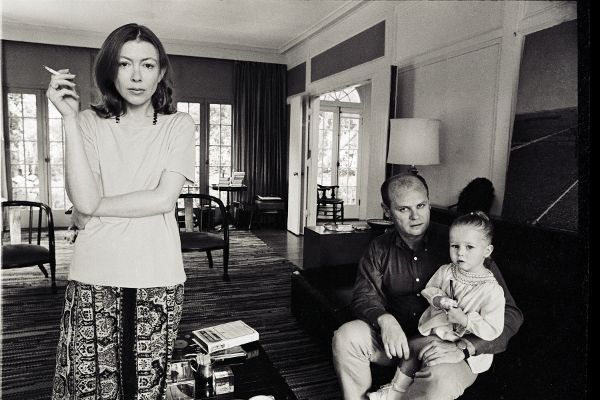Eye For Film >> Movies >> Joan Didion: The Center Will Not Hold (2017) Film Review
Joan Didion: The Center Will Not Hold
Reviewed by: Anne-Katrin Titze

"Remember what it is to be me - that is always the point," says Joan Didion in Griffin Dunne's deeply affecting portrait of his aunt.
Joan Didion: The Center Will Not Hold, a Spotlight on Documentary highlight of the New York Film Festival (where it had its world premiere), has a number of moments that linger long after the screening is over, ready to strike to the core.

Archival footage, family albums, interviews with family, friends, and colleagues (Anna Wintour, playwright David Hare, Calvin Trillin, The New Yorker's theater critic Hilton Als, and Vanessa Redgrave among them) and long conversations with Didion herself (while she prepares cucumber sandwiches in her kitchen, for example) give a sense of what it could be to be her. It's the words that stick and prompt you to connect to your own being in the world.
It all starts in the present time and then we learn about her childhood in Sacramento, California, New York at age 20, working for Vogue where she was assigned to write about "Self-respect - its Source, its Power", onto meeting her husband John Gregory Dunne and how she "fell in love with his family." After learning the lesson that "it's possible to stay too long at the fair," they leave New York for California.
To the annual Easter parties by the Pacific Ocean, their carpenter (who did their bookshelves, decks, walls and windows) was invited, too. He is the Blade Runner himself, Harrison Ford, and he tells Griffin in a great unexpected interview, how much he felt he "was out of his depth" but always welcome.
David Hare, during his stage production of The Year Of Magical Thinking on Broadway in 2007, based on Didion's book (published in 2005) about grief after the death of her husband in 2003 and the suffering of her daughter, who died in 2005, recalls feeding Joan, putting up a sign Café Didion. Vanessa Redgrave, who starred in the production is seen sitting next to Didion with both of them looking at photo albums together. Intimate moments like this get you so close to the writer and her relationships to others, that you might even want to apologise for watching them.
And what about John Wayne? Didion wrote about him in John Wayne: A Love Song, an essay in the collection Slouching Towards Bethlehem. She says to her nephew in the film that she herself never found a man who would take her to "that bend in the river where the cottonwoods grow." Dunne counters: "He's [John Wayne in the film War of the Wildcats] a protector. And you married a protector."
Let's take the snakes. Or rather, let's not take them. Another remarkable film delivers the absolutely perfect visual companion piece, snake-wise. Joachim Trier's Thelma, a feature about disorder in manifold ways, offers the Scandinavian relatives of the Didion snakes that haunted me for years. From time to time, when relevant, they come back when "food would seem to arrange itself into ominous coils."
Griffin Dunne begins a conversation about "coming to terms with disorder" and "when snakes would appear so much". Didion asks her nephew if he has any snakes and he responds that, no, he kills them. "Killing a snake is the same as having a snake," is Didion's stunning reply.
It is always wonderful when a film about a writer you admire produces sentences - be it in dialogue, commentary or excerpts you overlooked or forgot from the published texts - that are so poignant in the here and now and feel brand new. Raoul Peck did this with I Am Not Your Negro and Joan Didion: The Center Will Not Hold does it too.
The books, the beach, the cold Coca-Cola in the refrigerator, screenplays, the baby, politics, Janis Joplin, Sharon Tate, tears, work, sunglasses swirl by - the documentary almost overflows with a life so big.
Reviewed on: 20 Oct 2017













